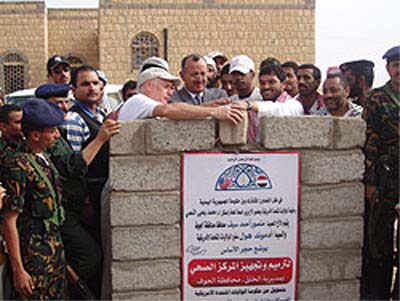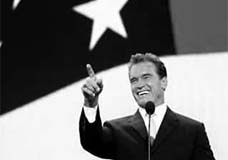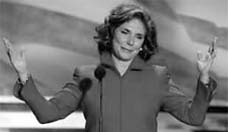
Tunisia RPCV Edmund Hull is no longer ambassador in Yemen, but many who had dealings with him in Yemen note he operated with a freedom that set him apart from his diplomatic peers
First the Guns, Now the Butter
by Kareem Fahim
October 19th, 2004 10:55 AM
SANAA, YEMEN—In this impoverished Arab nation, George W. Bush's America is at once the brute and the redeemer. In some eyes, it's a heavily armed belligerent that ignores Arab suffering in Iraq and Palestine; in other views, a generous nation, with the resources and a responsibility to lend a hand to developing states like this one.
Bush administration officials call Yemen a model for their new approach to the region. U.S. taxpayers have spent close to $300 million here, most of it in military aid, since 2001. Prompted by fears that Yemen was becoming both a source of and a haven for terrorism, the U.S. since 9-11 has become Yemen's largest development patron—edging out European countries like Germany and Holland, established here for decades. The U.S. has also become a powerful military benefactor to Yemeni president Ali Abdullah Saleh, guaranteeing him strength in return for cooperation in the terror war.
The alliance, say U.S. officials, means Yemen is a willing and more able partner in the fight against Al Qaeda. "We're lucky here," said one U.S. embassy official, who has worked in other Arab capitals. "People don't come up to you here and say you're screwing up Palestine and Iraq. They want to know what we're doing for them. It's refreshing."
What the U.S. is doing for them ranges from a raft of high-profile development schemes targeting poor and rural areas, which American officials here claim will alleviate the conditions in which extremism thrives, to a number of democratization projects, aimed at boosting local political institutions, the national parliament, and role of Yemeni women in politics and society.
For their money, Bush officials expect more than hospitality. In recent weeks, they complained quickly to the Yemeni government after it imprisoned an opposition journalist. If the pressure is real, it represents a marked change from America's usual reluctance to offend regional allies.
Those who remain wary of the U.S. approach—not just Yemenis, but also individuals working for nongovernmental organizations (NGOs) that the U.S. finances—fear that any development strategy focused narrowly on fighting terror calls into question the wisdom, longevity, and ultimately the success of the Bush administration's efforts.
"Just take the debates between John Kerry and George Bush," said Majid al-Fahed, the director of a Yemeni NGO. "Kerry says not to exaggerate the fear of terrorism. But here, if the fear of terrorism decreases, the U.S. will lose interest." Many also charge that it's delusion to believe that Yemenis ignore the conflicts in nearby Arab countries.
"Support for Israel damages our work in the region," said one official working with a prominent American-funded NGO. "So does the way [the Bush administration] has mishandled Iraq." The official recalled that pictures broadcast after the capture of Saddam Hussein enraged even Yemenis who loathed the former dictator. "You cannot work here on reform, or encouraging democracy and development, without saying it's all undercut by U.S. foreign policy."
Hearts and minds
The road east from Sanaa to the central Yemeni town of Marib wanders first past the dusty cement factories on the outskirts of the capital, then lurches skyward to trace the clove-like crags of Garlic Mountain, before descending again into a valley of black volcanic rock, buffered on its edges by powdery sand dunes.
No fewer than 10 checkpoints dot this route, islands of government authority that create the illusion of control. Until recently, this area was a magnet for kidnappers, tribesmen who would press their grievances against the central government with their hostages, who were often foreigners.
Now an impressive new health center sits just off the main road, a half-hour west of Marib and just a few hours' drive from the spot where, in 2002, the CIA killed Al Qaeda militant Abu Ali al-Harithi and his fellow passengers, blasting them with a Hellfire missile fired from a Predator drone.
A sign outside the clinic reveals it was financed by the "people of the United States of America." Inside, Sheikh Murdi Mabhooth Kuwalan, a handsome man with a booming voice, said he had expected a larger convoy from a visiting American. There had been a patient in the clinic, but they hurried him out to make room for what they assumed would be a big delegation.
Not long ago, such a mission made its way to this remote patch. Ambassador Edmund Hull, famous among Yemenis for his travels all over the country, visited Marib. "I met with him, and we had lunch together," said Sheikh Kuwalan, who is the brother of the district's big sheikh. "It was excellent. He tried to find out what projects we needed here. He related well with the people." One of the fruits of the meeting was the clinic, which the U.S. spent $350,000 to build. The medical director said the patients they treat here suffer mostly from diarrhea, respiratory problems, and malaria.
The clinic isn't finished yet, said Sheikh Kuwalan, and he has submitted a to-do list to the Americans, which includes building emergency facilities and separate quarters for women.
A U.S. embassy official said they were aware of the requests, and that in fact, the clinic, which is still "in progress," would probably serve mostly women. He added that they were considering a plan to convert the old health clinic, a forlorn mud structure, into a men's facility.
"People know this is a gift from the American people," said the sheikh proudly. "It's written on the plaque outside. If the gift is complete, the gratitude will be for the Americans." If the clinic wasn't completed, he added with a twinkle, they would still be grateful.
Edmund Hull is no longer ambassador, but many who had dealings with him in Yemen note he operated with a freedom that set him apart from his diplomatic peers. In a less complimentary assessment, a local newspaper accused him of behaving like a "high commissioner." An audience with Hull, who was said to occasionally wear cowboy hats to meetings, could be considered more useful than a get-together with a government minister. In the first place, he had at his disposal a large pool of funds for projects he thought important. And in a country where corruption and bureaucracy check even the simplest plans, his ability to move quickly on such projects was valued.
The health clinic, which when completed will be called a "rural hospital" by the Americans, satisfies what officials here say is their goal: that U.S. foreign policy should inform development. "A lot of these programs are intended to create a more educated, healthier society, so potential terrorists will have more to do with their lives," said an embassy official. "There's still the security arm of our development, which is capturing Al Qaeda."
Louis Coronado, the deputy head of the U.S. Agency for International Development (USAID) in Yemen, was careful to note that all the U.S. projects are joint efforts with the Yemeni government. "We're trying to support the hospital in Marib, the clinic, renovate schools, equip the hospitals," he said. "These are things that are tangible, visible. The taxpayer needs something [he] can see."
Slaughter of the 'Believing Youth'
This summer, violence returned again to Yemen, when Hussein al-Houthi, a former member of parliament once close to President Saleh, led a movement called the Believing Youth in a three-month revolt against the government in the northern mountains of Saada, one of the governorates that straddle the Saudi border. Thousands are thought to have been killed, hundreds of them civilians; but no one is sure, because the government has restricted access to the area. President Saleh's government branded al-Houthi—who had been issuing anti-Israeli and anti-American fatwas, or religious opinions—a terrorist financed by foreigners. Not long after, they killed him.
It wasn't the fact of the conflict that shocked Yemenis, but the ferocity. For underneath a fragile legal code here, there is a much respected tribal law, which usually intervenes when Yemenis quarrel with one another.
Most people think the government overreacted, but no one is sure why. At least one of the theories involves the U.S., positing that a Yemeni security official, sensing the prevailing winds, tried to prove his anti-terrorist credentials by unleashing his forces.
The speculation underscores another concern about America's growing involvement in this nascent model democracy: that the war on terror will extract a cost from Yemen's fragile political experiment, one it can scarcely afford.
A friendship's rewards
It was Yemen's uglier qualities, including lawlessness and the suspicion that terrorists would find easy refuge in the vast countryside, that made an alliance attractive to U.S. policy makers.
The country shot to infamy in October 2000, when militants linked to Al Qaeda rammed a hole in the side of the USS Cole while it was docked in the southern port of Aden, killing 17 American sailors. After September 11, Yemen's reputation took more hits, becoming known internationally as the ancestral homeland of Osama bin Laden's family and as the birthplace of Ramzi bin al-Shibh, the Al Qaeda militant captured in Pakistan thought to be one of the planners of 9-11.
Then came the attack on the French tanker Limburg in October 2002, and the murder two months later of three American missionaries. Security officials fretted about Yemen's often porous border with Saudi Arabia, and its hundreds of religious schools, concentrated mostly in the north, that tended toward strict Salafi teachings.
The military partnership, which had started modestly in the late 1990s, blossomed. The U.S. began to train counter-terrorism forces, provided technology to help monitor borders, and last year supplied the Yemeni coast guard with training and a fleet of ships.
In June of this year, President Saleh was one of just four Arab leaders who traveled to Georgia for the G8 Summit, where George W. Bush unveiled his much discussed Broader Middle East and North Africa Initiative. The initiative was an outgrowth of Bush's doctrine for reform in a vast area stretching from Pakistan to Morocco.
Bush had pledged that the spread of democracy and freedom in the Arab world should no longer suffer under the weight of Washington's traditional alliances. The traditional allies complained, and by the time the G8 convened, the initiative had been so diluted as to be almost meaningless. Regardless, Washington's closest Arab friends, including Saudi Arabia's crown prince Abdullah and Egyptian president Hosni Mubarak, skipped the meeting.
In Yemen—a country of over 22 million, with some oil but few other sources of exports—reform, democracy, and cooperation in the war on terror have combined to represent a substitute commodity. Civil society groups have become a cottage industry here, numbering in the hundreds and receiving hundreds of millions of dollars in foreign aid. "If the word's out that the Americans are funding women's initiatives, suddenly every NGO in Yemen is a women's group," one Washington-based researcher observed.
Yet for the U.S., the friendship has clear rewards. In the last three years, hundreds of Yemeni Al Qaeda suspects have been rounded up, interrogated, and thrown into Yemeni and American prisons, where many of them remain.
Build people, not buildings
Majid al-Fahed, the civil society advocate, says there are two advantages from what he calls the oversimplified notion that Yemen's tribal lands are breeding grounds for terrorism. "One of the results is that everyone started talking about the tribes, which is good. And secondly, a lot of aid started coming to Yemen." The problem, he noted, is that the government tells foreign donors the way to fight terror is to focus on education, and the donors buy it. In the case of the Americans, the emphasis seems to be on building or renovating schools.
"Who are the terrorists? Aren't they often educated? The advantages of education usually take a long time," he said. "You have a tribesman. He's not educated. But he's connected to his tribe. They're like any system, based on values. When you educate him, you pull him away from the tribal system. Then you don't give him a good job. So he's educated, but he's not part of that system anymore." In a district like Saada, one of the governorates America is focused on, al-Fahed, who has an unnerving head for figures, said that one in six people is a student.
"There's no building problem up there. There are 11,000 high school students. Do you know how many physics teachers there are? Eighteen. English teachers? Twenty-eight. The textbooks normally arrive by the second half of the school year." The same problems, he said, plague health care. "I've told the Americans and the British, you don't need more hospitals. Bring physicians from abroad. Bring in a Chinese doctor, and the community will build a hospital around him."
Will democracy retreat?
Regardless of what happened in Saada this summer—and most seem to agree that the death toll was almost certainly higher than the government let on—at the very least, the secrecy that hangs over the operation bodes badly for a country that is making real strides toward openness. Civil rights activists say the imprisonment of Abdul Karim al-Khaiwani, who wrote critically about the president and his operation against al-Houthi, is only the latest example of a crackdown on rights in the name of fighting terror.
Khaiwani's case was just one of the topics activists discussed on a recent afternoon in the home of Ali Saif. Saif, the president of a Yemeni group called the Political Forum, holds a regular "democracy" khat chew at his home, bringing together political activists, journalists, and other interested parties.
A good part of Yemeni life revolves around the narcotic plant khat. For hours in the afternoon, Yemenis sit around in specially designed rooms, the leaves of the plant wadded up in their cheeks as they discuss and socialize. They sip soft drinks from large glass bottles, or water from tiny metal cups, as they chew. U.S. embassy staff attend these khat chews unofficially; as one officer put it, to skip these sessions would mean missing a large part of Yemen's story.
Last Wednesday, Saif took his place on the far side of his sitting room, or mafraj, a white, constantly ringing phone at his feet. Also, there was a genial former engineer who was hoping to spend his retirement teaching Yemenis democracy; a young Moroccan working with youth for a German group; a grizzled old journalist who writes for Yemen's official press ("I really don't like my job," he said); and a bald, distinguished-looking lawyer who had a few clients charged in Yemeni courts with political crimes. People said controversial things. "The outside world will not accept the logo of democracy while [Saleh] is still president," someone said.
Apart from Khaiwani's case, they talked about Judge Mohammed Ali Luqman, who was just sentenced to 10 years in prison, allegedly for backing al-Houthi's revolt, and Ali Jarallah, who is standing trial for the 2002 murder of a Yemeni liberal activist named Jarallah Omar.
Mohammed Qahtan walked in late, and the discussion paused as he made himself comfortable. Qahtan is the political director of Islah, one of Yemen's main opposition parties. His is a legal Islamic party, one with members spanning the ideological spectrum. Qahtan spoke at length when his turn came, about the fragility of Yemeni democracy. After the meeting broke up he talked about the challenges of being in the opposition, and he looked anxious to confound his listener's expectations. "We'd like to stress that we need more support from our friends in the West," he said. "I've learned from my religion to look at value, not the person. The Americans are not angels, but they're not devils." Qahtan said he favored Bush's Middle East initiative, and called on Islamists in other parts of the Arab world to do the same. "There is no one more victimized by these regimes, and no one more helped by democracy," he said.
Still, in Yemen, as in other Arab countries, there is a strong sense that American foreign policy in the region works at cross-purposes with any help the Yemenis get from the U.S. Last year, an organization of women's journalists here very publicly refused a $19,000 grant from the U.S. State Department-based Middle East Partnership Initiative, saying they couldn't accept the money in good conscience while Israel was assassinating prominent Hamas leaders in the Gaza Strip.
But the American relationship is complicated, and nothing is absolute. A few months later, the same organization took money from the National Endowment for Democracy, which is funded by the U.S. Congress. A spokesman for the group said they decided there was a difference between government money and funds that came from the American people.




